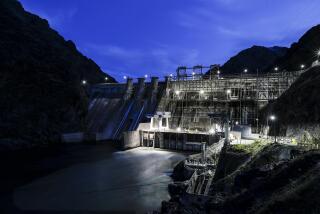Resentment grows over hydroelectric dam
- Share via
ITAIPU, PARAGUAY — In a region where nationalism often trumps cross-border cooperation, the engineering marvel known as Itaipu was a triumph of teamwork: Paraguay and its giant neighbor, Brazil, collaborated on a colossal project to reroute the mighty Parana River, dam its waters and create the world’s largest hydroelectric plant.
Thirty-five years after the two nations began the project, Itaipu is a vital source of cheap electricity and patriotic pride -- especially in Paraguay, a landlocked nation better known abroad for contraband, corruption and crooked politics. The plant provides more than 90% of the country’s electricity and about 20% of Brazil’s.
But resentment toward Brazil has grown since the election last month of Fernando Lugo as Paraguay’s president. He accuses his nation’s huge neighbor of benefiting from a sweetheart deal that yields power at cut-rate prices. Brazilians in turn say they are being unfairly painted as profiteers, their early financial and technical contributions to the project ignored.
The dispute pits Lugo, a former Roman Catholic bishop, against Brazilian President Luiz Inacio Lula da Silva, a former factory hand whose political ascension received a boost from the same progressive wing of the church that produced Lugo.
Both are burly, bearded men of Latin America’s new left. Both see Itaipu through nationalist eyes.
Paraguay, awash in electric power in an era of rapidly escalating global energy prices, is forced to sell to Brazil at bargain rates, Lugo argues.
“For us, a just price is the market price,” Lugo said after his historic April 20 election, which broke the six-decade hegemony of the Colorado Party. “We’ll fight to get it.”
Other Latin American nations, including Brazil, have been cashing in on the worldwide boom in commodities, from beef to copper. Paraguay’s major resource is water, and the power it produces.
During the campaign, Lugo’s assault on “Brazilian colonialism” and his demand for hydroelectric “justice” became themes. The slogans appealed to many Paraguayans’ sense that Brazil is picking their pockets -- paying off their political elite to maintain the lucrative Itaipu contract.
“We believe this treatment is unjust, that it generates economic and social inequity between our countries,” Lugo told The Times before his election.
Paraguay may also seek to modify a similar deal with Argentina for power from the smaller Yacyreta hydroelectric plant, downriver from Itaipu.
The controversy has raised deep misgivings and hurt feelings in Brazil, where a galloping economy and a population approaching 200 million strain available energy supplies. Electricity from Itaipu helps power the dynamic industrial hub of Sao Paulo, where Lula emerged from the assembly line.
Lula, widely esteemed as a leftist pragmatist, has said he will cooperate with Lugo, the latest avatar of the region’s shift to the left. But the Brazilian leader insists that renegotiating Itaipu’s terms, set out in a 1973 treaty signed when military dictatorships ruled both nations, is not in the cards.
“The treaty won’t be changed,” Lula declared after Lugo was elected.
In Brazil, commentators bemoan an ungrateful junior partner loath to acknowledge the largely Brazilian investment and technical know-how that went into creating Itaipu, a $16-billion venture that required a decade of massive construction before coming on stream in the mid-1980s. Brazil finds itself in the uncomfortable position of being cast as a bullying behemoth.
“Criticizing Brazil is a great electoral theme, it brings votes,” noted Francisco Gomide, a U.S.-educated hydrologist who formerly served as the Brazilian director for Itaipu. “The United States knows how it feels. Every time elections are held in Latin America, bashing the USA brings votes.”
The row underscores how left-leaning Latin American neighbors can have serious differences with one another despite ideological affinity.
Itaipu, about 200 miles east of Asuncion, the capital, is a vast, awe-inspiring complex that cries out for superlatives: The amount of iron and steel used in construction could erect 380 Eiffel Towers; enough concrete was poured to build 210 football stadiums. Deep inside its core, the relentless combination of falling water and whirling generators produces a perpetual low-level tremor.
The project also flooded the lands of tens of thousands of peasants. Environmental and social concerns would render Itaipu an unlikely option in today’s era of democracy.
Under current terms, the two nations co-manage Itaipu. Each is entitled to half of the plant’s electric output, which last year topped 90 million megawatt hours -- almost one-third of California’s annual electrical usage.
But Paraguay, with little industry, can use only about 5% of the power produced at Itaipu. Brazil gobbles up the rest, purchasing Paraguay’s surplus allotment at a fixed rate. The treaty bars Paraguay from selling the power elsewhere.
The current deal, Lugo argues, cheats cash-strapped Paraguay out of a fortune that could be invested in education and other long-neglected social needs in a nation where 4 of 10 residents are poor.
According to Lugo’s estimates, royalties and other payments to Paraguay could jump from about $300 million annually to almost $2 billion if Brazil paid market rates.
But Brazilian officials argue that Paraguay’s monetary analysis does not take into account debt payments, transmission costs and other factors. Itaipu is no cash cow for Brazil, they insist.
Nonetheless, Brazilian officials are keen to tamp down the rhetoric. The nasty tone threatens to mar Lula’s image as a Latin American unifier.
As an alternative, Brazilians have floated the idea of additional aid for Paraguay, perhaps to help the country replace its aging transmission lines or spur industrial growth. Brazil has agreed to have a “dialogue” about Itaipu, said Brazilian Foreign Minister Celso Amorim.
“Brazil does not want to be seen as an imperialist country,” Brazil’s top diplomat told O Globo newspaper. “We must have a generous vision.”
--
patrick.mcdonnell @latimes.com
--
Special correspondent Marcelo Soares in Sao Paulo contributed to this report.
More to Read
Sign up for Essential California
The most important California stories and recommendations in your inbox every morning.
You may occasionally receive promotional content from the Los Angeles Times.










